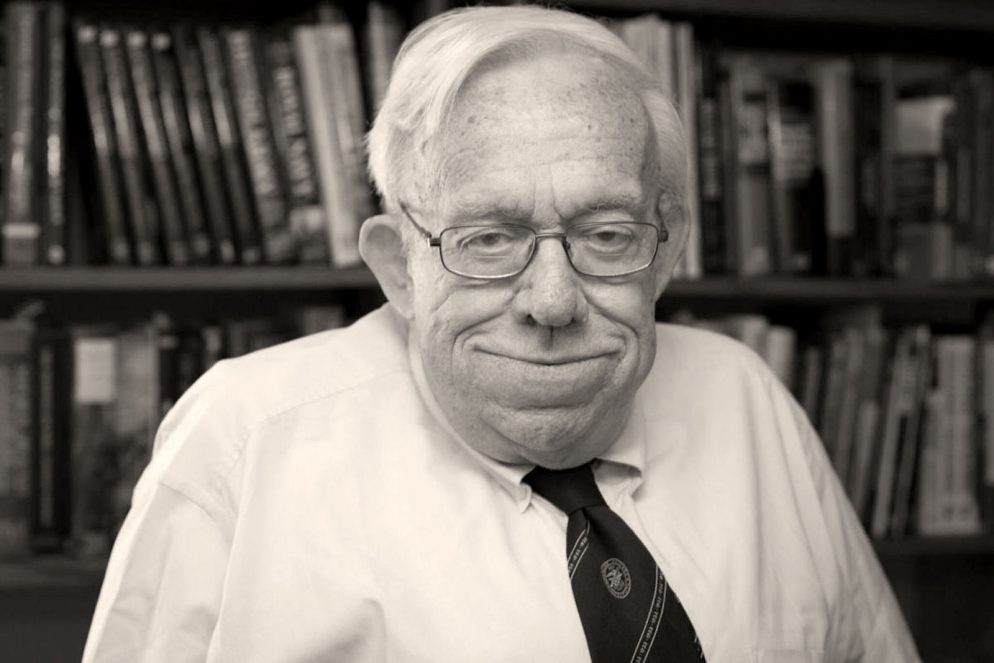Retired History Professor Emeritus Dennis Showalter, known to many even outside the department as “the most engaging professor at the school,” died Dec. 30, 2019, from complications related to esophageal cancer in Colorado Springs. He was 77.
Dennis claimed German military history as his specialty, but others note his influence on worldwide military history was his real claim to fame. As the author of 27 books on military history, Dennis’ love of the subject was shared with more than just his loyal and loving students at CC. He was invited to the Pentagon to brief the Joint Chiefs of Staff in 2019 on military doctrine and served in Tokyo as a consultant to the Japanese Ministry of Defense.
In 2018, Dennis won the Pritzker Military Museum and Library Literature Award for Lifetime Achievement in Military Writing. His reaction then was beyond surprise. “I still don’t believe it; it was unexpected,” Showalter said. “I hope it gives both my work and my future line of work a platform. It’s not merely desirable but necessary for citizens of the United States to study military history.”
Dennis was born on Feb. 12, 1942, in Delano, Minnesota. He attended St. John’s University for undergrad and earned his master’s and Ph.D. at the University of Minnesota. He married writer Clara Anne McKenna in November 1965, and had two children — Clara Kathleen and John Showalter — who all survive him today.
Dennis also taught at the University of Colorado at Colorado Springs, the Air Force Academy, West Point Military Academy, and the Marine Corps University. He was featured in multiple military history documentaries and was known for turning “history haters into history buffs.”
Dennis once said, “Ten years of teaching in a liberal arts college stressing classroom interaction have convinced me that the professor who hopes to remain an effective instructor must also maintain himself as a productive scholar.” True to form, he was in the middle of writing his 28th book, “Modern Warfare,” upon his death and expressed wishes for his family to finish and publish it after his passing.
January 8, 2020
To the Editor:
I write in reference to the loss of Professor Dennis E. Showalter this past Dec. 30, as reported in a tribute in the Colorado Springs Gazette on Jan. 4. I first heard Dr. Showalter at a lecture delivered in Olin Hall in the spring of 1970. He was a new assistant professor and I was a freshman. His talk was on aspects of Germany’s rise to military power on the eve of World War II. I was not a declared history major at that time, but had deep interest in the field and was enrolled in Dean George Drake’s Survey of Western Civilization to 1700, taught as a seminar in Cutler Hall and at the dean’s home. Showalter’s lecture, as well as meeting him in person, changed my life’s trajectory. I entered CC with the goal of becoming a high school music director and left in 1973 bound for graduate courses in history at U.C. Santa Barbara. In the interim, classes offered by Tom K. Barton, Arthur Pettit, Susan Ashley, Lewis Geiger, William Hochman, and especially Harvey Carter and Dennis Showalter, directed my focus toward emulating my two most esteemed mentors at CC.
Showalter’s zeal for his subject, passion to both inform and entertain his varied audiences from civilian service clubs to officer-candidates in our military academies, and his oratorical skills as lecturer remain my role model for successful college teaching from the lectern. He was also an excellent advisor and leader in seminars. As a scholar he produced over 20 major works, sharing his research and careful analysis of military issues far beyond Colorado Springs. Unlike many professors, Showalter published the research he shared in classes with colleagues and was always open-minded to peer review, a hallmark of the academy. As Mike Neilberg, professor of history at the U. S. Army War College put it in the Jan. 4 Gazette article, “He was a mentor and role model to an entire generation of military historians.” His 2018 Pritzker Prize for Lifetime Achievement in Military Writing (the ceremony for which I attended in Chicago) was both “a combination of an Oscar and a Pulitzer” as correctly reported in the Colorado College Bulletin (Summer 2018, p. 7). But there is so much more to the story of Showalter’s success and influence at the college and beyond.
I have many friends from my CC days who also admired Showalter for his method of teaching; and, I was his colleague as a visiting lecturer during 1977 to 1978, learning much from him as I taught seven different courses across nine blocks. I would not have made it through that “boot camp ordeal” (as he described it) without his advice and encouragement. Over the past four decades I corresponded occasionally with him and always looked forward to a meal and an update at reunions. I also own most of his books and have used some in my own class lectures on American military matters.
Many of us who took Showalter’s courses continue to talk about both the classes and the man who brought such unique energy and authority on a daily basis into Palmer Hall. This coming fall I am teaching History of Warfare for the first time after over 40 years as instructor of courses in North American history. My typed notes from War and Society Since the Renaissance (which I took in 1971) will form much of the material on the modern era. I am dedicating the course to the memory of Professor Showalter and trust the college will be celebrating his life with a major event and story in the Bulletin.
W. R. Swagerty ’73
Professor of history and director, John Muir Center
University of the Pacific
